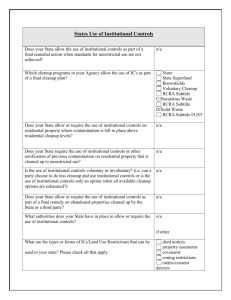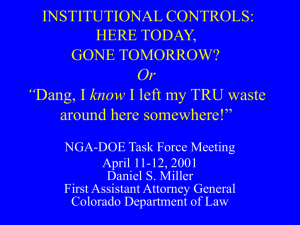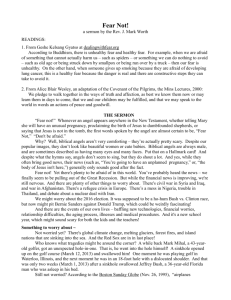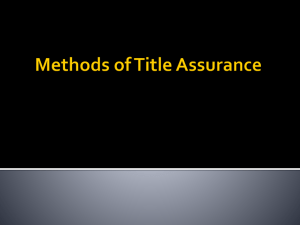pa Banker
advertisement
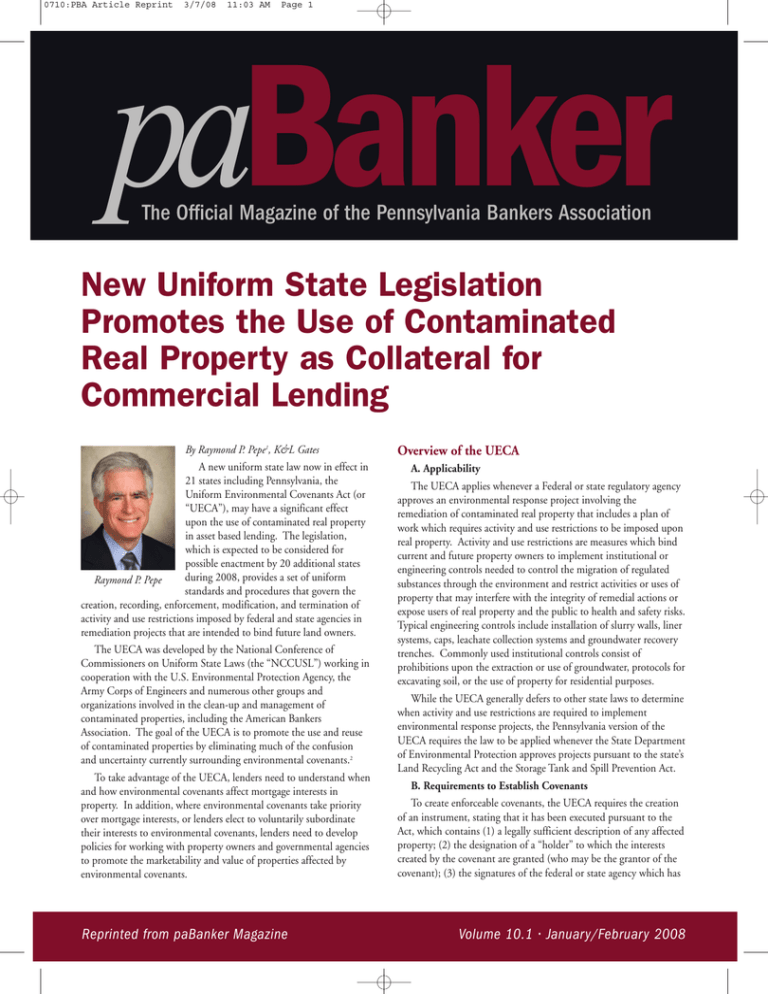
0710:PBA Article Reprint 3/7/08 11:03 AM Page 1 paBanker The Official Magazine of the Pennsylvania Bankers Association New Uniform State Legislation Promotes the Use of Contaminated Real Property as Collateral for Commercial Lending By Raymond P. Pepe1, K&L Gates A new uniform state law now in effect in 21 states including Pennsylvania, the Uniform Environmental Covenants Act (or “UECA”), may have a significant effect upon the use of contaminated real property in asset based lending. The legislation, which is expected to be considered for possible enactment by 20 additional states during 2008, provides a set of uniform Raymond P. Pepe standards and procedures that govern the creation, recording, enforcement, modification, and termination of activity and use restrictions imposed by federal and state agencies in remediation projects that are intended to bind future land owners. The UECA was developed by the National Conference of Commissioners on Uniform State Laws (the “NCCUSL”) working in cooperation with the U.S. Environmental Protection Agency, the Army Corps of Engineers and numerous other groups and organizations involved in the clean-up and management of contaminated properties, including the American Bankers Association. The goal of the UECA is to promote the use and reuse of contaminated properties by eliminating much of the confusion and uncertainty currently surrounding environmental covenants.2 To take advantage of the UECA, lenders need to understand when and how environmental covenants affect mortgage interests in property. In addition, where environmental covenants take priority over mortgage interests, or lenders elect to voluntarily subordinate their interests to environmental covenants, lenders need to develop policies for working with property owners and governmental agencies to promote the marketability and value of properties affected by environmental covenants. Reprinted from paBanker Magazine Overview of the UECA A. Applicability The UECA applies whenever a Federal or state regulatory agency approves an environmental response project involving the remediation of contaminated real property that includes a plan of work which requires activity and use restrictions to be imposed upon real property. Activity and use restrictions are measures which bind current and future property owners to implement institutional or engineering controls needed to control the migration of regulated substances through the environment and restrict activities or uses of property that may interfere with the integrity of remedial actions or expose users of real property and the public to health and safety risks. Typical engineering controls include installation of slurry walls, liner systems, caps, leachate collection systems and groundwater recovery trenches. Commonly used institutional controls consist of prohibitions upon the extraction or use of groundwater, protocols for excavating soil, or the use of property for residential purposes. While the UECA generally defers to other state laws to determine when activity and use restrictions are required to implement environmental response projects, the Pennsylvania version of the UECA requires the law to be applied whenever the State Department of Environmental Protection approves projects pursuant to the state’s Land Recycling Act and the Storage Tank and Spill Prevention Act. B. Requirements to Establish Covenants To create enforceable covenants, the UECA requires the creation of an instrument, stating that it has been executed pursuant to the Act, which contains (1) a legally sufficient description of any affected property; (2) the designation of a “holder” to which the interests created by the covenant are granted (who may be the grantor of the covenant); (3) the signatures of the federal or state agency which has Volume 10.1 • January/February 2008 0710:PBA Article Reprint 3/7/08 11:03 AM Page 2 approved the environmental response project, the holder of the covenant, and the fee simple owner of the property (or other persons required to sign the covenant by the response agency); (4) a description of the activity and use restrictions; and (5) a disclosure of the location at which the full administrative record regarding the response project is maintained. In addition, the covenant must be recorded in the county land records and with a central registry established by a state agency, for example, in Pennsylvania; covenants must be registered with the Department of Environmental Protection. Beyond the minimum required contents of an environmental covenant, instruments establishing covenants may require notice of transfer of specified interests in an affected property or a change in its use; require the filing of periodic reports; grant designated parties access to property; describe the manner in which the property has been contaminated and the contamination remedied; establish limitations on the termination or amendment of the covenant; and designate any rights granted to a holder in addition to the right to enforce the covenant. C. Legal Impact of Environmental Covenants Under the traditional law of environmental servitudes, numerous questions have historically arisen regarding the enforceability of covenants. For example, questions exist regarding whether holders of covenants must own interests in real property in order for covenants to run with the land rather than creating only personal obligations. Similarly, it is uncertain whether and to what extent covenants may be assigned to new holders; whether covenants may impose affirmative duties rather than only negative obligations; and whether current property owners may designate themselves as holders of covenants. An environmental covenant can be a key component of an environmental cleanup so the uncertainty about their validity and enforcement has been of concern to regulatory agencies and to entities that are potentially responsible for cleanup. The UECA clarifies that any person may be a holder of a covenant, including a current or prior property owner, a mortgagee, a land conservancy, or a state or local agency. The UECA also specifies the circumstances under which covenants may be assigned to new holders and clearly allows covenants to impose affirmative obligations upon landowners. D. Duration and Modification of Environmental Covenants Once established, the UECA provides that an environmental covenant is perpetual unless it is (1) limited by its terms to a specific duration or terminated by the occurrence of a specific event; (2) terminated or modified by the consent of the parties to the covenant; (3) terminated or modified by a court based upon a change in circumstances; or (4) terminated by foreclosure or eminent domain. The UECA provides that judicial proceedings to modify or terminate an environmental covenant may only be initiated with the consent of the agency that approved the covenant. The refusal of an environmental agency to consent to the modification or termination of a covenant, however, constitutes a final agency action subject to administrative appeal. Jurisdiction over proceedings to terminate or modify covenants falls with courts with jurisdiction over other matters affecting title to real property, while administrative appeals are subject to state administrative procedure laws. Vol 10.1 • January/February 2008 In Pennsylvania, judicial termination or modification proceedings will fall under the jurisdiction of county Courts of Common Pleas, while administrative agency appeals will fall under the jurisdiction of the Environmental Hearing Board unless an agency other than the State Department of Environmental Protection approves an environmental response project. E. Voluntary Modification of Environmental Covenants The UECA requires consent for the voluntary termination or modification of an environmental covenant be obtained from the agency that approved the covenant, all of the original parties to the covenant, the owner (unless waived by the response agency), and the holder of the covenant. Alternatively, the UECA allows any party to waive its right to consent to the termination or modification of an environmental covenant. In circumstances in which a party to a covenant no longer exists or cannot be located or identified with the exercise of reasonable diligence, the UECA allows a court to fill a vacancy in the position of holder and allows the parties to a covenant to agree to remove and replace a holder. F. Enforcement and the Impact of Environmental Covenants Upon Holders of Prior Interests in Property, including Mortgages The UECA authorizes the initiation of civil actions for injunctive relief for remedy violations of environmental covenants. An enforcement actions may be initiated by (1) any party to a covenant; (2) the agency that approved the covenant; (3) any person to whom the covenant expressly grants enforcement powers; (4) any person “whose interest in the real property or whose collateral or liability may be affected by the alleged violation of the covenant; or (5) a municipality in which the real property subject to the covenant is located. Although environmental covenants are enforceable against property owners and others who expressly assume obligations pursuant to the covenants, the UECA provides that interests in properties that have priority under other laws, such as mortgages, are not affected by environmental covenants, unless such interests are voluntarily subordinated to the covenants. The UECA also provides that holders of interests with priority over environmental covenants are not required to subordinate their interest to environmental covenants or agree to be bound by the covenants and that foreclosure of interests with priority over covenants terminates the covenants. When holders of interests in property with priority over environmental covenants subordinate their interests to the covenants, the UECA provides that while subordination affects the priority of interests, it does not by itself impose any affirmative obligation upon subordinated property owners with respect to environmental covenants. The Pennsylvania UECA The Pennsylvania version of the UECA takes effect on February 16, 2008, and closely follows the text of the Uniform Act. The Pennsylvania UECA, however, differs from the law in effect in most other jurisdictions in the several areas.3 www.pabanker.com 0710:PBA Article Reprint 3/7/08 11:03 AM Page 3 A. Impact on Existing Covenants The UECA generally applies both to new covenants entered into after its enactment in a jurisdiction and validates against common law defenses covenants executed prior to its adoption. Pennsylvania modified the general rules regarding the impact of the UECA upon existing covenants, however, by requiring all previously established activity and use limitations adopted pursuant to environmental response projects to be “converted” into environmental covenants within 60 months, unless mandatory conversion is waived by the Department of Environmental Protection. While the failure to convert pre-existing covenants into environmental covenants under the UECA does not affect the validity of pre-existing covenants, the failure to convert previously existing covenants does expose property owners and holders of covenants to potential penalties and enforcement actions for the failure to comply with conversion requirements. The requirements for the conversion of existing activity and use restrictions into environmental covenants under the UECA are unclear and hopefully will be clarified by regulations or guidance issued in the near future by the Pennsylvania Department of Environmental Protection. At a minimum, conversion will require the recording of existing covenants in conformity with the requirements of the UECA in county land records and in a central registry that will be created by the DEP. A danger does exist, however, that DEP may in some circumstances use conversion requirements to re-evaluate the terms and conditions of existing covenants. To avoid this potential, it may be in the interest of property owners and others with interests in property affected by covenants to voluntarily re-record covenants in the format required by the UECA prior to being directed to do so by DEP. B. Deemed Approvals On of the unique features of Pennsylvania’s Land Recycling Act is that when parties seek approval for voluntary remediation of contaminated properties and DEP fails in a timely manner to either approve or disapprove clean-up plans, the plans are deemed approved by operation of law. The Pennsylvania version of the UECA applies this same concept to DEP’s review and approval of environmental covenants. Under the Pennsylvania UECA, covenants are deemed approved within 90 days of the receipt by DEP of all information reasonably required to make a determination regarding approval or disapproval of an environmental covenant. In the event of a deemed approval, an environmental covenant presented for recording and registration must include a statement that the environmental covenant was deemed approved by operation of law. C. Recording of Waivers As noted previously, consent to the voluntary termination or modification of environmental covenants must be obtained from multiple parties, but parties may waive in advance their right to consent. Under the Pennsylvania Act, any such waivers must be recorded in county land records and in DEP’s central registry in the same manner as the covenants themselves. Pennsylvania law also requires covenants, and waivers to covenants, to comply with all other laws governing the recording of title to real property. Vol 10.1 • January/February 2008 Critical Issues for Financial Institutions The existence of environmental covenants with respect to real properties used as collateral for mortgage lending should be taken into consideration as part of the portfolio risk management strategy of any financial institution. The risks associated with properties subject to environmental covenants should be taken into consideration when initiating loans, acquiring loans initiated by other financial institutions, and as part of a financial institutions ongoing portfolio management process. In dealing with environmental covenants, it is critical to recognize that the execution and recording of an environmental covenant in most circumstances does not represent an event that will impair the quality of an asset. Instead, it is the contamination of real property that impairs its value as collateral. The execution of an environmental covenant is a strategy needed to control and limit a property owner’s liability to remediate contamination and improve the quality of an asset. Unfortunatly, not all covenants are created equally and some may be more or less advantageous to financial institutions from the perspective of minimizing the risks associated with lending collateralized by contaminated real property. As a result, when confronted with transactions involving properties that have been or may be subject to environmental covenants, lenders should carefully evaluate how the specific terms of a covenant affect mortgage interests in property. In particular, lenders should consider the following issues: A. Designation of Holders Who should be designated as the holder of a covenant? If the grantor of a covenant also designates itself as the holder, will and should the holder continue to be a party to the covenant upon the transfer of title to the real property to a new owner? Where the grantor of a covenant is a sophisticated party with the resources to monitor and supervise enforcement of environmental covenants, it may be in the interests of a lender to ensure the continued designator of the grantor as a holder who is a party to the covenant. Alternatively, where a property may become more valuable when a new owner of the property is also designated as the holder of a covenant, a lender may wish to include in a covenant conditions allowing the transfer of the rights of the holder to another party. B. Compliance Obligations While environmental covenants will in most cases impose obligations on the fee simple owner of property, lenders may wish to consider whether other parties should be designated as responsible for compliance with activity and use restrictions. The UECA does not mandate that obligations imposed by environmental covenants apply to fee simple owners of property and allows obligations to be imposed upon other parties. For example, where a prior owner was responsible for, or assumed responsibility for contamination, it may be preferable to designate a prior owner as responsible for ensuring compliance with environmental covenants. Likewise, situations may exist where obligations should be imposed upon a long-term lessee with the ability to manage and control a site, rather than the fee simple title holder. www.pabanker.com 0710:PBA Article Reprint 3/7/08 11:03 AM Page 4 C. Notice and Reporting Obligations While environmental covenants need not include notice and reporting obligations, the inclusion of such obligations in covenants may be beneficial to lenders. For example, lenders may wish to be designated as parties to which notices must be given of proposed changes in the use of or transfer of a property. In addition, to ensure compliance with environmental covenants, lenders may find it desirable to include in environmental covenants requirements for periodic reports to environmental agencies, copies of which must be provided to lenders. D. Waivers and Termination Provisions Because the existence of waivers to consents to the termination, modification, or transfer of obligations imposed by environmental covenants may be critical to ensure that mortgage interests are effectively enforceable, lenders should carefully consider when to request blanket waivers or waivers that take effect in designate circumstances. Likewise, because covenants are assumed to be of perpetual duration, it may be desirable to include specific terms and conditions in covenants providing for their termination upon certain events, or requiring their periodic reevaluation pursuant to designated standards. E. Subordination Where mortgage interests hold priority over environmental covenants, lenders should consider whether it is desirable to subordinate their interests to the covenants or to insist upon maintaining their priority. In determining whether to agree to subordination, lenders need to balance the benefits associated with making property more marketable and a mortgage interest more valuable against the risks and delays involved in “re-opening” remediation projects that may arise if foreclosure terminates an environmental covenant. In addition, because Federal and state agencies may refuse to limit or release property owners from clean-up related obligations unless certain prior property interests, including mortgages, are subordinated to environmental covenants, lenders may conclude that subordination is critical to ensuring the continued ability of borrowers to satisfy payment obligations. Boston, Dallas, Fort Worth, Harrisburg, Hong Kong, London, Los Angeles, Miami, Newark, New York, Orange County, Palo Alto, Paris, Pittsburgh, Portland, San Francisco, Seattle, Spokane/Coeur d'Alene, Taipei and Washington, D.C. 2 The National Conference of Commissioners on Uniform State Laws is a state government supported organization established in 1892 which is committed to the objective of providing states with non-partisan, wellconceived and well-drafted legislation that brings clarity and stability to critical areas of state statutory law. Members of the Conference are practicing lawyers, judges, legislators and legislative staff and law professors, who have been appointed by state governments as well as the District of Columbia, Puerto Rico and the U.S. Virgin Islands to research, draft and promote enactment of uniform state laws in areas of state law where uniformity is desirable and practical. 3 Other unique provisions of the Pennsylvania UECA are discussed in testimony provided by Mr. Pepe to the Pennsylvania House Environmental Resources and Energy Committee on September 27, 2005. A copy of this testimony is available at www.klgates.com (check “newsstand” listings). The final version of the UECA adopted in Pennsylvania differs only in several minor areas from the version discussed in Mr. Pepe’s 2005 testimony. 4 ©Kirkpatrick & Lockhart Preston Gates Ellis LLP. This article is provided for informational purposes and does not contain or convey legal advice. The information herein should not be used or relied upon in regard to any particular facts or circumstances without first consulting a lawyer. This article may be reproduced and disseminated in print and electronic form, without compensation, for non-commercial purposes, so long as the full title, identification of Kirkpatrick & Lockhart Preston Gates Ellis LLP as source, date of issuance and copyright information are included in all copies and changes are not made to the text of the article. More Information The text of the UECA promulgated by the National Conference of Commissioners on Uniform State Laws contains a detailed prefatory note and section-by-section comments that explain the intent and recommended interpretation of the law. In addition, more information regarding the UECA is available at www.nccusl.org or at www.environmentalcovenants.org.4 The full text of the Pennsylvania version of the UECA, Act 68 of 2007, is available at www.legis.state.pa.us. PB A 1 Mr. Pepe is a partner in the Harrisburg Office of the law firm of Kirkpatrick & Lockhart Preston Gates Ellis, LLP, located at 17 North Second Street, Harrisburg, PA, 17101-1507. He can be contacted at 717.231.5988 or Raymond.Pepe@KLGates.com. Mr. Pepe serves as outside regulatory and legislative counsel to the Pennsylvania Bankers Association and has served as a Pennsylvania Delegate to the National Conference of Commissioners on Uniform State Laws since 1983. K&L Gates is an international law firm consisting of more than over 1,500 lawyers practicing in offices located in Anchorage, Austin, Beijing, Berlin, Vol 10.1 • January/February 2008 www.pabanker.com

